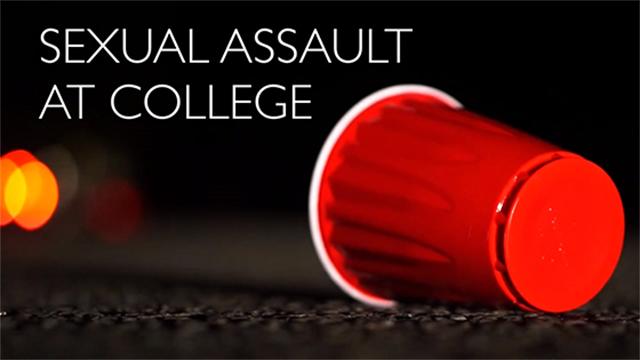Will 'yes means yes' laws change the rules of sex?
- Published
- comments

Could sex on university campuses soon require a lot more talking?
California Governor Jerry Brown signed the country's first affirmative consent law last week, which requires that both partners give ongoing consent during sexual activity.
Following suit, New York Governor Andrew Cuomo last week ordered all of state-run universities to include an affirmative consent policy in their sexual assault investigation guidelines.
The law defines affirmative consent as a conscious and voluntary agreement to engage in sexual activity. Under the law, lack of protest, silence or previous sexual history do not count as consent.
This "yes means yes" law is designed to make consent the responsibilities of both sexual partners, not just the woman - but not everyone is on board with the new law.
"Most of us know what this kind of consent looks like in practice, but as a legal standard, it's hard to imagine how it would be implemented," writes, external the Nation's Michelle Goldberg. "Do moans count as consent? How about a nod, or a smile, or meaningful eye contact?"
Goldberg says that the main weaknesses in the law are the preconceived notion that sexual assault stems from a lack of communication and the blurring of the line between assault and consensual sex.
While the law may do some good by encouraging partners to have a dialogue about what they want or don't want to happen, Goldberg says it may be too vague.
Amy Otto, external writes in The Federalist that the push to obtain clear consent can lead down a path that could hurt women.
She cites the Good2Go app which was designed to record who you are sleeping with, when you are sleeping with them and how intoxicated you were at the time. The app was designed to increase communication and avoid "he said, she said" situations, but it was recently removed from the Apple app store, external following intense criticism.
Although Good2Go is gone, Otto says that the future implications of this law will look a lot like this kind of public documentation of sex, which could backfire.
"The first time a girl has her 'affirmative consent' used to shame her in public, expect backlash from the same people who pushed this in the first place while mocking anyone questioning the unintended consequences of regulating what used to be a private act," she writes.
At the heart of the affirmative consent debate is a fundamental misunderstanding of how human sexuality works, writes, external Shikha Dalmia for the Week. What's more, it might just ruin good sex.
She says that both partners during sex are rarely on exactly the same page in terms of desire, but this shouldn't mean that what happens is necessarily a criminal act.
"The reality is that much of sex is not consensual - but it is also not non-consensual. It resides in a gray area in-between, where sexual experimentation and discovery happen," she says.
Writing for the Cut, external, Ann Friedman argues otherwise.
"There's a long history of women - especially young, straight women - having sex that's consensual but not really much fun. And an equally long history of their male partners walking home the next morning thinking, 'Nailed it'," she writes.
This law will force students in consenting sexual relationships to be more open - and thus, have better sex.
"Most young men, it bears repeating, aren't rapists. Even in the absence of a university policy, they are worried about inadvertently doing something in bed that their partner doesn't welcome. And most men are actively thinking about whether their partner is enjoying herself. The new law makes life easier for both them and the women they sleep with, because it creates a compelling reason for both parties to speak up and talk about what they like," she says.
The affirmative consent movement's defenders also say confusion and unfounded hysteria surround California's efforts.
Yes the law is imperfect, Slate's Jenny Kutner writes, external, but it does not mean that men will suddenly face a rash of unfair accusations.
"Innocent men are not routinely convicted as rapists, and they will not routinely be convicted as rapists under affirmative consent laws," she says.
While this law will make it easier to convict those who have committed sexual assault, it could also lead to a positive change in the overall culture.
"Instead of pushing ahead when a young woman says she 'isn't sure' she wants to have sex, there will be a young man who pursues a direct, enthusiastic 'yes' before moving forward. There will be college students thinking twice about their actions, talking about sex and then, one hopes, having it consensually."
Townhall's Conn Carroll agrees, external.
"All this law does is alter one element required for a sexual assault charge and shift the burden of proof to a 'preponderance of the evidence' standard," he writes, which will make it easier for schools to punish bad actors. Yes, that might result in more men being expelled or suspended, but he doesn't see that as a problem. After all, just because schools are notoriously bad at punishing those accused of sexual assault, it doesn't mean that the accused haven't committed an offence.
"I do not care if these behaviours 'typically' are not punished now," he says. "Many of them should be."
(By Kierran Petersen)
- Published1 October 2014

- Published16 June 2014

- Published20 February 2014
